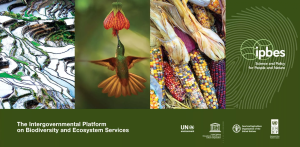IPBES global report achieves global consensus on the impacts invasive alien species and the need for coordinated global action
Guest Post by Dr. Laura A. Meyerson

Meyerson, pictured above, co-lead the IBPES Biological Invasions report. Copyright: Laura Meyerson
For the last 4.5 years, I have had the honor of working with a core team of 86 experts from 47 countries to help produce a global assessment of invasive alien species. The report was launched on September 4, 2023, in Bonn, Germany by the Intergovernmental Science-Policy Platform on Biodiversity and Ecosystem Services (IPBES). The report presents overwhelming evidence on the threats invasive alien species pose to nature, nature’s services to people, and economies. For the first time, a global consensus on the impacts of invasive alien species was reach and the Summary for Policy Makers was approved by 143 member countries of IPBES.
The report found that invasive alien species are one of the main drivers of biodiversity loss globally, have contributed to at least 60% of extinctions globally. More than 37,000 non-native species have been introduced to ecosystems and regions around the world and more than a third these introductions have occurred since 1970. A 36% increase in new alien species introductions is expected by 2050 under a “business-as-usual” scenario. In terms of impacts, 34% are reported in the Americas, 31% in Europe and Central Asia, 25% in the Asia Pacific region, and 7% Africa. Most documented impacts (75% ) are reported in terrestrial ecosystems, 14% in freshwater ecosystems, 10% marine ecosystems. More than 2,300 invasive alien species were documented on lands managed, used and/or owned by Indigenous Peoples, but globally lands owned, managed and/or used by Indigenous Peoples had lower numbers of alien species. The cost of biological invasions totaled over $423 billion in 2019 and this cost is expected to quadruple every decade.

The report also provides open access to its database on the trends and status of invasive alien species, and more data on data gaps for taxa, ecosystems, regions and impacts will be available soon.
The hope is that this report will galvanize research in understudied regions and for lesser studied taxa and ecosystems and greater investments in prevention, early detection and rapid response to prevent biological invasions in the first place.
About the author, Dr. Laura A. Meyerson, University of Rhode Island, College of Environmental Sciences, Dept. of Natural Resources Science: https://web.uri.edu/nrs/meet/laura-a-meyerson/